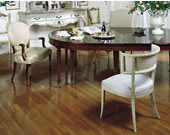Adding hardwood flooring to your home can be a great investment, since most new homeowners are looking for the upgraded look and feel of hardwood floors. If you are planning to sell an existing home, hardwood floors will enhance the sales potential of your home. In most cases your home will sell much faster than a home that does not have hardwood flooring. Buyers appear to have a preference for hardwood flooring everywhere.
Not only does it look great but it is long lasting and can withstand many years  of use however hardwood flooring can be expensive. As an alternative to true hardwood, an engineered hardwood floor can be a great option. Especially for those who want the advantages of a hardwood floor while spending less. Here is some information for those interested in engineered hardwood floor. Carpeting on the other hand begins to look tired even after a few years, Especially if there is a lot of foot traffic on some areas. Stick to hardwood if you are buying a new home or upgrading and replacing your existing flooring.
of use however hardwood flooring can be expensive. As an alternative to true hardwood, an engineered hardwood floor can be a great option. Especially for those who want the advantages of a hardwood floor while spending less. Here is some information for those interested in engineered hardwood floor. Carpeting on the other hand begins to look tired even after a few years, Especially if there is a lot of foot traffic on some areas. Stick to hardwood if you are buying a new home or upgrading and replacing your existing flooring.
Engineered Hardwood Floors
Engineered hardwood floors are made with an inner core of hardwood, high density fiberboard (HDF), or plywood and on top of this a layer of wood veneer is glued. The outer wood veneer layer can be found in almost every kind of hardwood species. This means you can have the same great look of all the varieties of hardwood flooring available. The outer veneer layer can come in varying thickness as well so you can find flooring that will be long lasting and will stand up to wear.
A great advantage of engineered hardwood floor is that the inner core material is designed to allow greater stability. True hardwood floors are very sensitive to heat and moisture and can expand, contract and warp. This could lead to gaps forming or cupping of the boards among other things. So in essence you have the best of both worlds. The outer veneer layer is the same wood you would see in solid hardwood but the inner engineered core of engineered hardwood floor makes the flooring less sensitive to the effects of heat and water damage.
A Big Disadvantage
One big disadvantage of an engineered hardwood floor is the number of times that the floor can be refinished. Basically when you refinish a floor, you are removing the top layer of varnish. Aslo some of the wood as well to get down to untreated hardwood. Since an engineered hardwood floor has a veneer it is limited in the number of times that you can refinish it. You should take good care of your floor. Don’t allow shoes to be warn on the floor and clean regularly. Your floor will last for many years without the need to be sanded. Consumers have been know to get as many as 20 years out of a floor before refinishing.
Impacts on Your Homes Resale Price
If you are planing to sell their home take into account the age and how well it has been looked after. Also whether the floor needs to be refinished or not. This could be a potential negative for a buyer. If you plan to stay in your home for many years chances are that you will need to refinish the floor at some point. You will want to take this issue into account. Especially before you make the decision to go with the engineered hardwood floor variety.
An engineered hardwood floor is a great way to have the beauty and charm of hardwood flooring with less worry over the floor stability. Take the time to look further into the many advantages of this type of flooring. Talk to the experts and compare the advantages and disadvantages for your new hardwood flooring design.
August 30th, 2012 on 4:34 am
we prefer the real hardwood floors that are prefinished. once they are installed they are ready to use and installation is pretty straightforward too. My husband installed all of our floors and did a fantastic job !